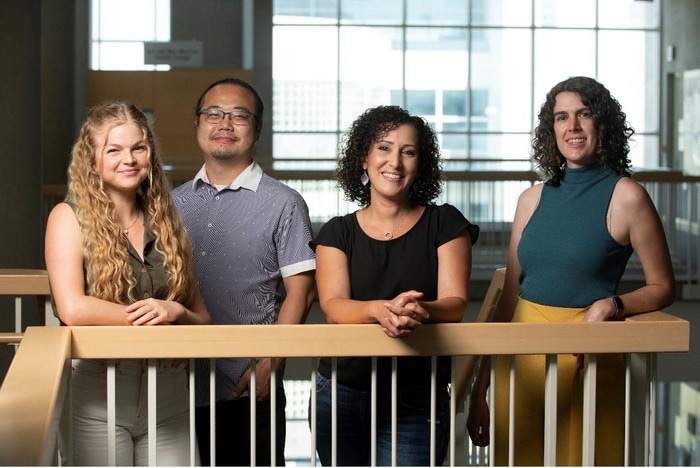Scientists from the University of California, Irvine, have defined how the circadian clock impacts cell growth, metabolism, and tumor progression in a new study. Their findings also show how disrupting the circadian clock affects genome consistency and mutations, which can push serious tumor-promoting pathways in the intestine.
 From left: Bridget Fortin (Graduate student and co-first author), Sung Kook Chun, PhD (Postdoctoral fellow and co-first author), Selma Masri, PhD, (Principal investigator and corresponding author), and Rachel Fellows, PhD (Postdoctoral fellow and co-first author), all from the UCI School of Medicine Department of Biological Chemistry. Image Credit: UCI School of Medicine
From left: Bridget Fortin (Graduate student and co-first author), Sung Kook Chun, PhD (Postdoctoral fellow and co-first author), Selma Masri, PhD, (Principal investigator and corresponding author), and Rachel Fellows, PhD (Postdoctoral fellow and co-first author), all from the UCI School of Medicine Department of Biological Chemistry. Image Credit: UCI School of Medicine
The research was published in Science Advances.
The scientists discovered in this study that both genetic and environmental disruption of the circadian clock adds to the mutation of the adenomatous polyposis coli (APC) tumor suppressor, which is discovered in the large majority of human colorectal cancers (CRC).
In 80% of human CRC cases, APC point mutations, removals, and loss of heterozygosity (LOH) occurrences have been revealed, and it is these mutations that push the onset of intestinal adenoma growth.
As a society, we are exposed to several environmental factors that influence our biological clock, including night shift work, extended light exposure, changes in sleep/wake cycles and altered feeding behavior.”
Selma Masri, PhD, Assistant Professor, Biological Chemistry, School of Medicine, University of California, Irvine
“Strikingly, we have seen an alarming increase in several young-onset cancers, including colorectal cancer. The underlying cause of this increased incidence of cancer in adults in their 20s and 30s remains undefined. However, based on our findings, we now believe that disruption of the circadian clock plays an important role,” says Masri.
As reported by the National Institutes of Health, there is an exponential trend in young-onset colorectal cancer. Presently, nearly 10% of CRC cases are diagnosed in people under the age of 50, and this trend is continuing. Environmental factors like lifestyle and dietary factors, which are known to impact the circadian clock, are suspected potential risks.
APC mutations are also linked to second hits in key oncogenic pathways such as Kras, Braf, p53, and Smad4, and these mutations drive progression to adenocarcinoma, all of which contribute to the disease process. The findings now link circadian clock disruption to extra genomic mutations that contribute to the progression of colorectal cancer.
The circadian clock is an internal biological timekeeper that regulates a variety of physiological methods. The Masri Lab’s research is primarily concerned with how disruption of the circadian clock contributes to the growth and advancement of certain cancer types. The Masri Lab is actively conducting additional research to determine how the circadian clock affects other cancer types.
Source:
Journal reference:
Chun, S. K., et al. (2022) Disruption of the circadian clock drives Apc loss of heterozygosity to accelerate colorectal cancer. Science Advances. doi.org/10.1126/sciadv.abo2389.